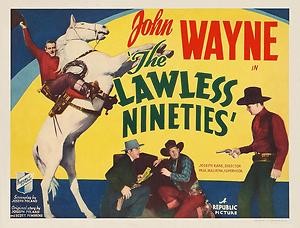| Reviews & Columns |
|
Reviews DVD TV on DVD Blu-ray 4K UHD International DVDs In Theaters Reviews by Studio Video Games Features Collector Series DVDs Easter Egg Database Interviews DVD Talk Radio Feature Articles Columns Anime Talk DVD Savant Horror DVDs The M.O.D. Squad Art House HD Talk Silent DVD
|
DVD Talk Forum |
|
|
| Resources |
|
DVD Price Search Customer Service #'s RCE Info Links |
|
Columns
|
|
|
Lawless Nineties, The
The most, maybe only distinguishing feature of The Lawless Nineties is the prominent role given character actor George Hayes, who only months before created his iconic Western sidekick character, usually called Windy Halliday in the Hopalong Cassiday films, and then later "Gabby" Whittaker (or just "Gabby" Hayes) in his films for Republic and elsewhere. He was, as far as this reviewer goes, the greatest Western sidekick of them all, and his persona is famous even among those who've never seen a Western of any sort. In The Lawless Nineties he plays a distinguished citizen quite unlike that much more familiar persona, one so different even many Western fans probably wouldn't recognize him.
As with Olive Films' other '30s John Wayne titles from Republic, the high-definition video transfer is something of a revelation. The picture quality is extraordinarily sharp and the audio is, for its era, impressively clean and clear.
In The Lawless Nineties Wayne plays government agent John Tipton who, with fellow agent Bridger (Lane Chandler), is dispatched to Crockett City, Wyoming Territory, to work undercover and ensure its upcoming election on the matter of statehood is run fairly. Near the border, Tipton meets Major Carter (George Hayes), his adult daughter, Janet (Ann Rutherford), and their manservant Moses Pluribus Unum (Snowflake), who have run afoul of outlaws determined by hook or crook to turn away pro-statehood homesteaders.
Major Carter reestablishes the Crockett City Blade, the local newspaper, writing editorials supporting statehood. At a rally his speech elicits wild cheers from the townsfolk, but a telling, wincing smile from Crockett City's "most respected citizen" and Chairman of the Committee of Law & Order, Charles Plummer (Harry Woods) immediately pegs him as the "brain heavy." He's the brains and money behind the outlaws' violent efforts, though henchman Steele (Al Bridge) remains the opposition's public face.
The Lawless Nineties is mildly interesting for its depiction of blatant efforts by Plummer to deny citizens their right to vote while he in turn commits outrageous acts of fraud (henchmen voting multiple times, etc.) to beef up votes for his side. Mostly though the film is run of the mill and even more predictable than usual for a B-Western.
What is unusual, at least from a modern perspective, is the sight of George Hayes playing a character as far removed from his Gabby character as can be imagined. In contrast to the toothless, uneducated, unwashed, crabby and excitable Gabby, Hayes's Major Carter is exquisitely groomed, articulate, gentlemanly and distinguished. Hayes, of course, played a notably diverse range of roles from his entry into films around 1929 through the mid-1930s. But after around 1936 he played Gabby or variations thereof almost exclusively until his last film in 1950 and subsequent TV series, The Gabby Hayes Show, which wrapped in 1956.
The real George Hayes was much closer to his Major Carter character than Gabby, as one might expect, but Hayes was such a fine, underappreciated actor that he convinced a generation of moviegoers that George Hayes and Gabby were one and the same. To see him out of character nowadays is like seeing Emmett Kelly without his clown makeup, wearing a dinner jacket and smoking a pipe. Making this even more pronounced is the realization that Hayes's natural voice, even minus all the "consarn its" and "dadgumits" was nothing at all like his Gabby voice. In short, Hayes was an extremely good actor in "straight" roles like this one here and surely would have prospered but, on the other hand, had he not recognized Gabby's popularity Hayes probably would be less remembered.
Video & Audio
Olive's video transfer of The Lawless Nineties is impeccable, and once again it's really great to see even a B-Western as minor as this looking so sparklingly good. The black-and-white, 1.37:1 image is pristine throughout, with only minor imperfections inherent to the original film elements. Detail, blacks, and contrast are all very impressive. The Region A disc has decent audio, English only with no subtitle options, and No Extra Features.
Parting Thoughts
Though minor The Lawless Nineties is yet another very welcome release from Olive Films, one that John Wayne and B-Western fans will find worthwhile regardless of its general ordinariness, and for them it's Recommended.
Stuart Galbraith IV is a Kyoto-based film historian whose work includes film history books, DVD and Blu-ray audio commentaries and special features. Visit Stuart's Cine Blogarama here.
|
| Popular Reviews |
| Sponsored Links |
|
|
| Sponsored Links |
|
|
| Release List | Reviews | Shop | Newsletter | Forum | DVD Giveaways | Blu-Ray | Advertise |
|
Copyright 2024 DVDTalk.com All Rights Reserved. Legal Info, Privacy Policy, Terms of Use,
Manage Preferences,
Your Privacy Choices | |||||||















